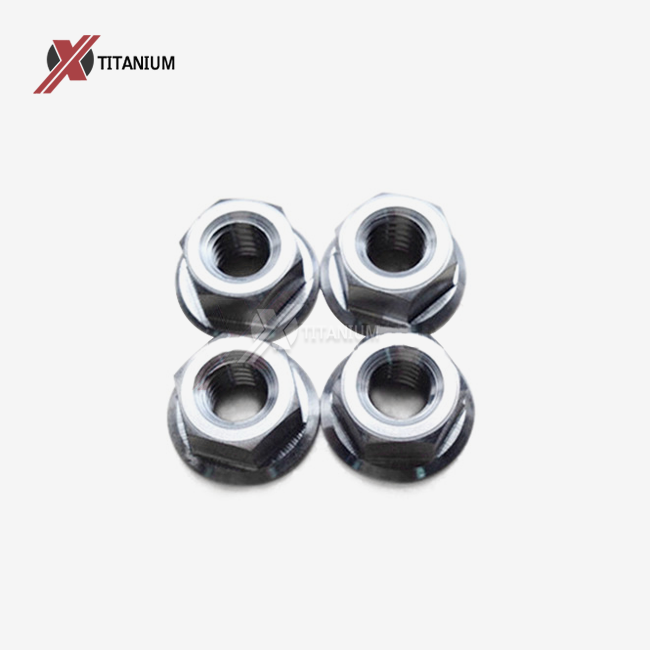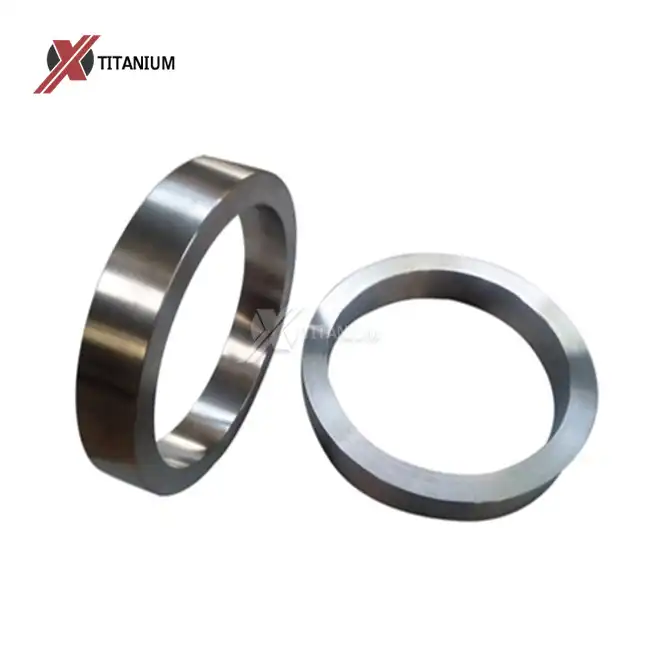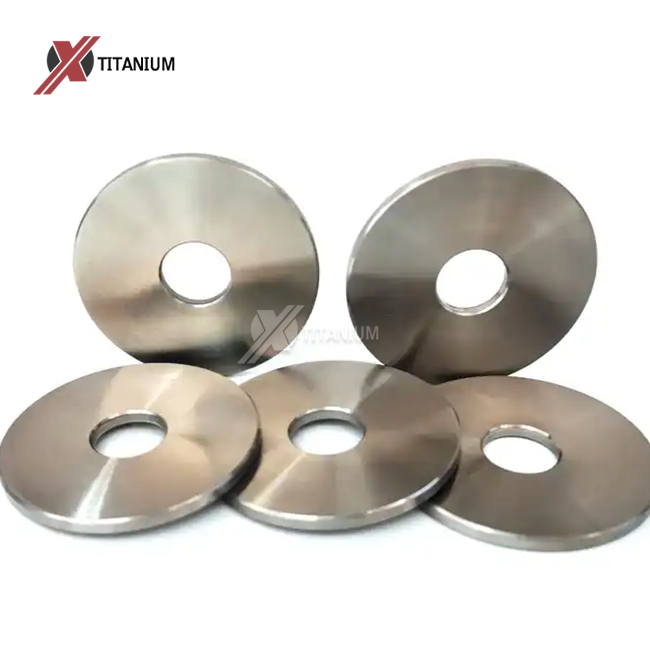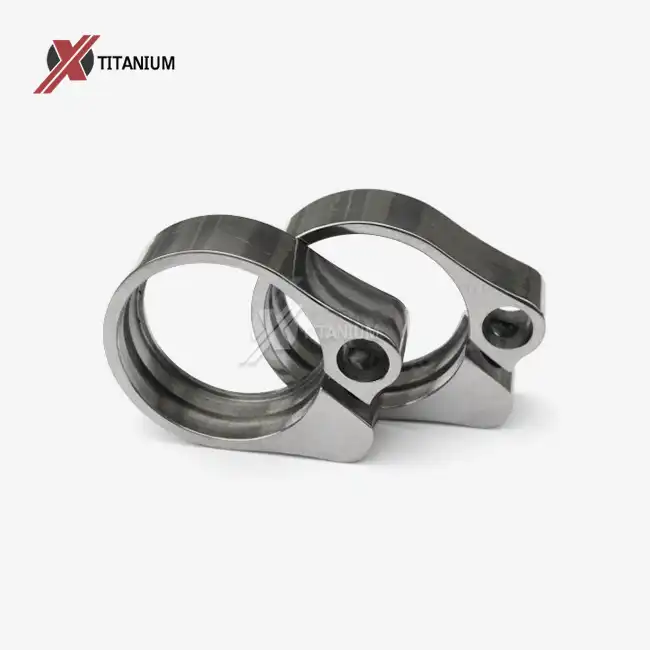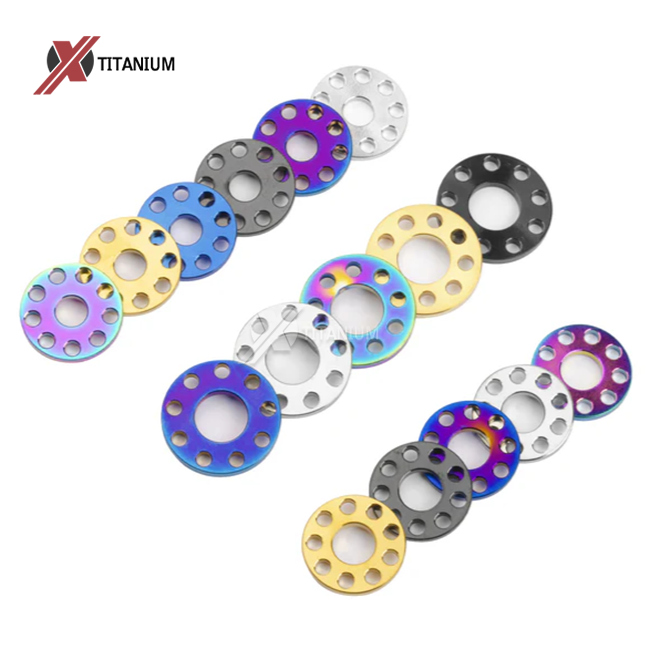The Unparalleled Advantages of Titanium Flange Nuts in Chemical Processing
Corrosion Resistance: A Game-Changer for Chemical Plants
In the chemical industry, corrosion is a relentless adversary that can compromise the integrity of equipment and lead to costly shutdowns. Titanium flange nuts emerge as a formidable solution to this challenge, offering unmatched corrosion resistance that far surpasses traditional materials. The inherent properties of titanium allow these fasteners to maintain their structural integrity even when exposed to aggressive chemicals, acids, and alkaline solutions.
The secret behind titanium's exceptional corrosion resistance lies in its ability to form a protective oxide layer on its surface. This naturally occurring film acts as a barrier, shielding the underlying metal from chemical attack. As a result, titanium flange nuts can withstand prolonged exposure to corrosive environments without degradation, ensuring the longevity of critical connections in chemical processing equipment.
Strength-to-Weight Ratio: Enhancing Efficiency and Safety
The remarkable strength-to-weight ratio of titanium flange nuts offers a significant advantage in chemical plant operations. Despite their lightweight nature, these fasteners boast impressive mechanical properties that rival or exceed those of heavier alternatives. This unique combination of strength and lightness translates into several benefits for chemical processing facilities.
Firstly, the high strength of titanium flange nuts ensures secure and reliable connections, even under extreme pressure and temperature conditions. This robustness is crucial in chemical plants where safety is paramount, and equipment failure can have severe consequences. The ability of products to maintain their integrity under demanding conditions contributes to the overall safety and reliability of chemical processing systems.
Secondly, the lightweight nature of titanium flange nuts simplifies installation and maintenance procedures. Technicians can handle and maneuver these fasteners with greater ease, reducing fatigue and improving efficiency during assembly or repair tasks. This ease of handling is particularly valuable in complex piping systems or hard-to-reach areas within chemical plants, where every ounce of weight saved can make a significant difference in work ergonomics and safety.
Furthermore, the use of lightweight titanium flange nuts can contribute to overall weight reduction in chemical processing equipment. While the weight difference may seem negligible for individual fasteners, the cumulative effect across an entire plant can be substantial. Reduced equipment weight can lead to lower transportation costs, easier installation, and potentially decreased structural support requirements, all of which can result in cost savings and improved operational efficiency.
Temperature and Pressure Resistance: Meeting Extreme Demands
Chemical processing often involves extreme temperatures and pressures, creating a challenging environment for components like flange nuts. Titanium flange nuts excel in these conditions, offering exceptional resistance to both high and low temperatures without compromising their mechanical properties. This thermal stability ensures that connections remain secure and leak-free across a wide range of operating conditions.
At elevated temperatures, many materials suffer from creep, a phenomenon where the metal deforms slowly over time under stress. Titanium, however, exhibits excellent creep resistance, maintaining its strength and dimensional stability even at high temperatures. This property is crucial in chemical plants where processes may involve heat-intensive reactions or high-temperature fluid handling. Titanium flange nuts can withstand these conditions without loosening or deforming, preserving the integrity of critical connections.
Innovative Applications of Titanium Flange Nuts in Chemical Engineering
Revolutionizing Reactor Design and Safety
The integration of titanium flange nuts in chemical reactor design has ushered in a new era of safety and efficiency. These specialized fasteners play a pivotal role in securing reactor vessels, ensuring a hermetic seal that prevents the escape of hazardous materials. The corrosion resistance of it is particularly valuable in reactors processing aggressive chemicals, where traditional fasteners might deteriorate rapidly.
Engineers are leveraging the unique properties of titanium flange nuts to design more compact and efficient reactors. The high strength-to-weight ratio allows for the use of fewer fasteners without compromising structural integrity, resulting in streamlined designs that are easier to maintain and operate. This reduction in complexity not only enhances safety but also contributes to improved energy efficiency and reduced downtime for maintenance.
Enhancing Corrosion Management in Petrochemical Processing
The petrochemical industry faces some of the most corrosive environments in chemical processing, making the use of titanium flange nuts increasingly prevalent. These fasteners have proven instrumental in managing corrosion in critical areas such as distillation columns, heat exchangers, and pipeline systems.
One notable application is in the desulfurization units of refineries, where titanium flange nuts withstand the highly corrosive conditions associated with sulfur removal processes. Their ability to maintain structural integrity in the presence of hydrogen sulfide and other sulfur compounds ensures the reliability of connections in these critical systems.
Titanium flange nuts are also making waves in offshore petrochemical facilities, where exposure to seawater adds another layer of corrosion challenges. The exceptional resistance of titanium to saltwater corrosion makes these fasteners ideal for use in offshore platforms, subsea equipment, and coastal refineries.
Advancing Clean Energy Technologies
The chemical industry plays a crucial role in the development and production of clean energy technologies, and titanium flange nuts are at the forefront of this innovation. In the production of hydrogen fuel cells, these fasteners are essential for maintaining the integrity of electrolysis units and storage systems.
Solar thermal power plants, which use concentrated sunlight to generate electricity, also benefit from the unique properties of titanium flange nuts. These fasteners are used in the heat transfer systems that circulate molten salts or other high-temperature fluids. The ability of products to withstand extreme temperatures and corrosive media ensures the reliability of these critical systems, contributing to the efficient operation of solar thermal facilities.
Future Prospects and Innovations in Titanium Flange Nut Technology
Advancements in Manufacturing Techniques
The future of titanium flange nuts in chemical processing looks promising, with ongoing advancements in manufacturing techniques poised to enhance their performance and expand their applications. Additive manufacturing, or 3D printing, is emerging as a game-changing technology in the production of titanium components, including flange nuts.
3D-printed titanium flange nuts can be tailored to specific application requirements, incorporating features such as improved thread designs for enhanced sealing or integrated locking mechanisms to prevent loosening under vibration. The ability to fine-tune the internal structure of the fasteners also opens up possibilities for weight reduction without compromising strength, pushing the boundaries of the already impressive strength-to-weight ratio of titanium.
Integration with Smart Manufacturing and Industry 4.0
As chemical plants embrace the principles of Industry 4.0 and smart manufacturing, titanium flange nuts are set to play a role in this digital transformation. The integration of sensors and smart technologies with these critical fasteners opens up new possibilities for real-time monitoring and predictive maintenance in chemical processing equipment.
Imagine titanium flange nuts equipped with embedded sensors capable of detecting changes in pressure, temperature, or even chemical composition. These smart fasteners could provide valuable data on the condition of equipment, alerting operators to potential issues before they escalate into failures. This proactive approach to maintenance could significantly reduce downtime and enhance the overall safety and efficiency of chemical plants.
Expanding Applications in Emerging Industries
As new industries emerge and existing ones evolve, the applications for titanium flange nuts in chemical processing continue to expand. One area of growing interest is in the field of advanced materials production, particularly in the manufacture of nanomaterials and specialty polymers. These processes often involve corrosive precursors and extreme conditions, making titanium flange nuts an ideal choice for ensuring the integrity of production equipment.
The burgeoning field of biotechnology and biopharmaceuticals also presents new opportunities for titanium flange nuts. In the production of biologics and advanced therapies, maintaining ultra-pure environments is crucial. The biocompatibility and corrosion resistance of titanium make these fasteners well-suited for use in bioreactors and other critical processing equipment where contamination must be rigorously avoided.
Conclusion
The reliance of chemical plants on titanium flange nuts is not merely a trend but a testament to the unparalleled advantages these fasteners offer in harsh processing environments. From their exceptional corrosion resistance to their ability to withstand extreme temperatures and pressures, titanium flange nuts have proven indispensable in ensuring the safety, efficiency, and longevity of chemical processing equipment. As the industry continues to evolve, embracing new technologies and facing increasingly complex challenges, the role of titanium flange nuts is set to grow even more significant.
To learn more about how titanium flange nuts can benefit your chemical processing operations or to discuss specific applications, don't hesitate to reach out to industry experts. For detailed information and tailored solutions, contact Baoji Chuanglian New Metal Material Co., Ltd. at info@cltifastener.com or djy6580@aliyun.com. Their team of specialists can provide valuable insights and assist in selecting the right titanium fasteners for your unique processing needs, ensuring your plant stays at the forefront of efficiency and reliability in the ever-evolving chemical industry landscape.
